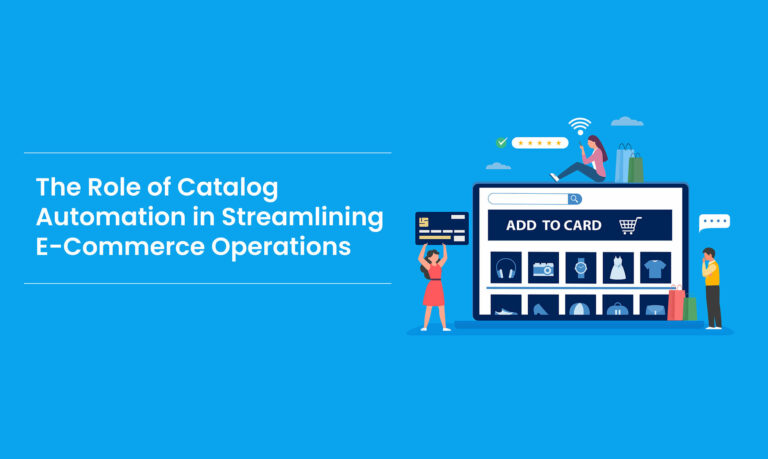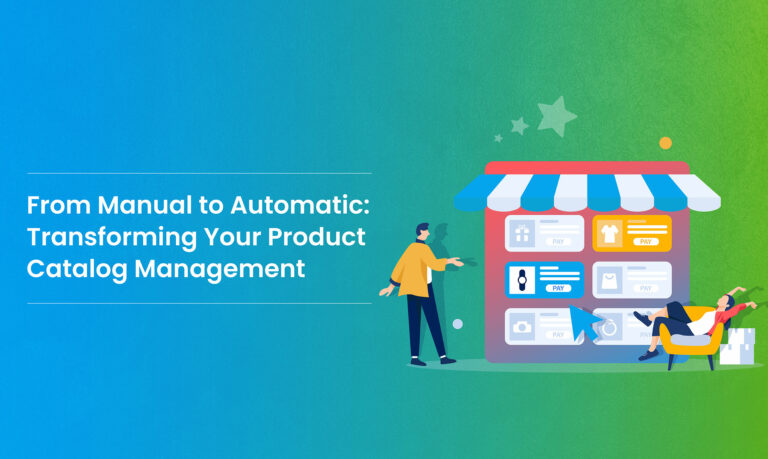What is catalog management? It includes organizing, combining, refreshing, and managing product data to create fluid workflows. It is pivotal for the success of any online store, and Rubick.ai offers cutting-edge solutions to transform eCommerce ventures. By harnessing catalog management, businesses can optimize product accessibility and information, which is crucial for fostering consumer trust and enhancing the shopping experience. The continuous optimization of product catalogs is imperative to stay ahead in the competitive landscape, offering an omnichannel experience, accelerating sales, optimizing eCommerce performance, and fortifying brand reputation.
Challenges like inventory management and data accuracy necessitate innovative approaches and automation tools. Rubick.ai advocates for regular inventory audits, strategic product categorization, detailed descriptions, and data-driven catalog strategies. Partnering with professional catalog management services like Rubick.ai ensures streamlined product information management, inventory control, and seamless integration with marketplaces, ultimately helping businesses enhance ecommerce success and drive sales revenue to new heights.
Introduction
Do you want to turn your online store into a roaring success? If yes, you may want to unleash the many potentials of catalog management for online stores. Read this blog to find out some cool tips to revamp your eCommerce store with the power of catalog management. Explore Rubick.ai, one of the fastest-growing cataloging solution services for your eCommerce cataloging needs.
Why Catalog Management?
The first step to eCommerce business success is building an online store to sell your products or services. But are all your products accessible with relevant information? Is your online store optimized for success and convincing enough for the visitors to make a buying decision?
If the answer is no and you want to revolutionalize your online store business for greater profits, you must make them more functional than fashionable through efficient catalog management.
The main goal of catalog management for online stores is to build trust and image in the eyes of consumers. The potential of catalog management is such that it can attract the right target audience, expand your product line and take less time to manage your inventory.
Creating intuitive product catalogs is quintessential to guiding your shoppers through the buying process. Poor catalog management can lead to an information deficit, resulting in fewer sales and higher returns.
Why do brands need to optimize their product catalogs continuously?
- To truly give an omnichannel experience
- To stand out from the competition
- To accelerate sales and profits
- To build brand reputation and long-lasting trust
Challenges of Catalog Management
The next-generation experiences in eCommerce catalogs and online stores demand continuous growth and innovation. The main challenge is to revamp your online store regularly to improve user experience and meet business needs. Also, using automation tools and AI is essential to personalize product recommendations and implement upscaling and cross-selling.
Moreover, cutting-edge technologies are necessary to deliver a better shopping experience for customers. Making data-backed decisions, too, is critical to optimize sales strategies that enhance profits.
Maintaining an extensive and ever-changing product portfolio can be overwhelming. You can lose sales if you fail to create a cohesive experience across sales channels.
Boosting online sales with cataloging solutions can increase your brand reputation. A professional service provider can help with catalog management for online stores by adding, modifying, and distributing product information.
Revolutionalize Your Online Store
Here are some tips to improve catalog management and revamp your online store. Here are some essential solutions for mastering eCommerce cataloging.
- Audit Inventory Regularly
One of the best practices is to regularly perform inventory audits and verify the authenticity of the product information. It helps in reviewing and modifying product data from time to time.
- Determine Profitable Products
Manage your product catalog and identify which products get the most sales. Capitalize and give more exposure to top-selling products throughout your website.
- Consistent Product Categorization
Outline the information in a structured manner, such as product title, description, pricing, and specification. Use a unique identifier in the product catalog and ensure a consistent omnichannel presence. Ensure product categorizations and update data regularly.
- Product Tagging
With a proper tagging system, you can streamline catalog information updates, allow customers to browse easily, and enable better inventory control.
- Appropriate Product Descriptions
Write detailed product descriptions with correct dimensions and specifications. Describe products clearly to grab visitors’ attention and convert them to paying customers. Provide easy navigation so the browsers stumble upon their requirements and add to their shopping cart.
- Accurate Shopping Data
To drive the visitors into ordering products, ensure accurate shopping data across all channels. Mismanaged measurement units can make you lose customers and slow your online business.
- Data-Backed Catalog Strategy
Use real-time demographics and monitor user behavior. Curate your catalog strategy according to the data and modify/update catalog information according to user needs.
- Get Professional Catalog Solutions
Partner with professional catalog management services that help streamline product information management, catalog organization for online retailers, inventory management, data checks, and provide integration with marketplaces.
Conclusion
Whether you want to set up your online product catalog, need smart listing, effective catalog updates for eCommerce, data, or product information management, Rubick.ai is your one-stop shop! Revolutionalize your online store with cataloging solutions and boost your eCommerce sales revenue.


